
Home visits by mobile GPs are booming in Australia, causing some doctors to question whether the “Uberisation” of medicine is ripping off Medicare.
New data shows the growth in private companies offering “free”, bulk-billed home doctor consultations in people’s homes out of business hours has cost Medicare $662.1 million since 2010, challenging traditional “family doctor” GP clinics.
The services have been a boon for people who want a doctor to visit them at home between 6pm and 8am during the week and on weekends and public holidays. In some cases, the doctors will provide pharmaceutical treatments such as anti-nausea drugs, saving people a visit to a pharmacy.
But some GPs say the companies behind the services are taking advantage of generous rebates for after hours visits and using inexperienced junior doctors to drive profits.
The rebate for after-hours visits classified as “urgent” is $130 to $150, compared to $55 for a non-urgent visit or $36 for a standard visit in a doctor’s surgery.
Department of Health data shows $195 million was billed to the Medicare Benefits Schedule for urgent after-hours visits in 2015, compared to $90.8 million in 2010.
Royal Australian College of General Practitioners president Frank Jones said the college was looking closely at the medical deputising services that provided after-hours visits.
“It’s consumer driven and that’s the 21st century,” Dr Jones said. “And there’s a business imperative by some of the after hours services to increase their profit. I think this is an important debate for our society to have around appropriate use of after hours services.”
He was also concerned that deputising services were allowed to hire GPs in training or overseas doctors who had not yet been admitted to the RACGP because they were deemed to fill an “unmet need”.
“We want quality driven after-hours services, we want these services to be accredited to RACGP standards, and we also believe the doctors who are providing the services should at least be fellows of the RACGP,” Dr Jones said.
It has become increasingly rare for general practitioners to make house calls and most of them now use deputising services that allow them to outsource their after-hours calls to locum agencies.
Family Practice Medical Research Centre medical director Graeme Miller said it was difficult to tell what people were using the services for because there had been so many changes to the Medicare Benefits Scheme item numbers.
“There’s a lot of allegations going around that some of these are not emergencies and the patients should go to their GP during the day, but you can make exactly the same allegations about people in the emergency departments,” Associate Professor Miller said.
The financial impost to Medicare from urgent after-hours visits was much less than what the same patient would cost the public health system if they went to emergency, he said.
The average cost of a patient presenting at the emergency department is $578.
Newcastle GP Lee Fong said medical deputising services were crucial, but some companies were creating demand with marketing campaigns that emphasised a free service.
“It might cost $130 for someone to be seen at 11 o’clock at night and when that’s appropriate, that’s great, but when it’s driven by marketing for convenience that’s not the best use of our dollar,” said Dr Fong, a clinical director of GP Access After Hours, which provides a telephone advice and home visit service rostered by 250 GPs.
Health Minister Sussan Ley said she would be “extremely concerned” if deputising services were classifying calls as urgent when they were not.
“It is fraudulent to claim the Medicare rebate on services or treatment which has not been provided,” Ms Ley said.
The May budget allocated $66.2 million to Medicare compliance.
National Home Doctor Service chief executive Ben Keneally said 80 per cent of calls to 13SICK were classified as urgent, but the assessment was up to the individual GP.
“We don’t give our doctors any advice on that because they’ve got to make their independent decision,” Mr Keneally said.
“The way most doctors think about it is, ‘Was the patient genuinely concerned about their illness and did it need treatment when I arrived?’.”
Patients used the service 1.5 times a year on average, he said, which implied they were not using it instead of their normal GP.
About 70 per cent of the GPs employed were not fellows of the RACGP, but junior doctors or overseas-trained GPs who were required to work 10 years in Australia before they could be admitted to the college, he said. “Because they’re willing do the work.”
“Our doctors have full medical registration, at least two years post graduate experience as hospital residents and specific experience in emergency and paediatrics.”
A 2014 review of after-hours sector commissioned by the federal government called for an urgent examination of the rapid escalation of after hours services being billed to the MBS.
It found that existing policies and regulations did not encourage judicious use of such services, with evidence that some medical deputising services were “overzealous” in converting calls into home visits.
Former health adviser Terry Barnes said the Howard government had created incentives to after-hours doctors under the MBS to deter relieve pressure on emergency departments, but it had only recently become a business model.
“I wouldn’t say they’re gaming the system so much as they’ve seen a niche business opportunity,” Mr Barnes said. “Most things don’t need to have a doctor house calling after hours. You either present to emergency department or you see your own doctor in the morning, but if you’re advertising a bulk-billing service to your door, it’s hard to resist for some people.”
